In this "nuanced, discerning account of a life famously flawed in its search for perfection" (The New Yorker), Gordon captures Eliot's "complex spiritual and artistic history . . . with tact, diligence, and subtlety" (Boston Globe). Drawing on recently discovered letters, she addresses in full the issue of Eliot's anti-Semitism as well as the less-noted issue of his misogyny. Her account "rescues both the poet and the man from the simplifying abstractions that have always been applied to him" (The New York Times), and is "definitive but not dogmatic, sympathetic without taking sides. . . . Its voice rings with authority" (Baltimore Sun). Praised by Cynthia Ozick as "daring, strong, psychologically brilliant," Gordon's study remains true to the mysteries of art as she chronicles the poet's "insistent search for salvation."

In this "nuanced, discerning account of a life famously flawed in its search for perfection" (The New Yorker), Gordon captures Eliot's "complex spiritual and artistic history . . . with tact, diligence, and subtlety" (Boston Globe). Drawing on recently discovered letters, she addresses in full the issue of Eliot's anti-Semitism as well as the less-noted issue of his misogyny. Her account "rescues both the poet and the man from the simplifying abstractions that have always been applied to him" (The New York Times), and is "definitive but not dogmatic, sympathetic without taking sides. . . . Its voice rings with authority" (Baltimore Sun). Praised by Cynthia Ozick as "daring, strong, psychologically brilliant," Gordon's study remains true to the mysteries of art as she chronicles the poet's "insistent search for salvation."